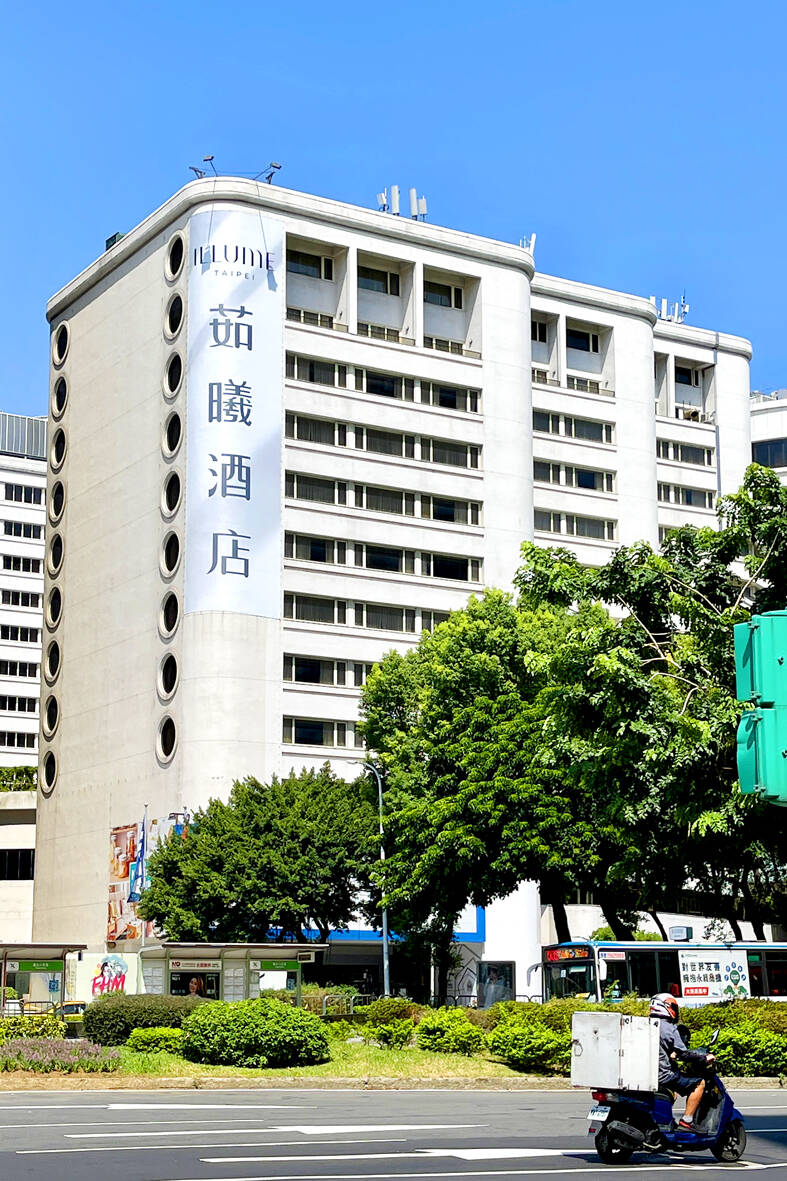Food and beverage sales at Illume Taipei (茹曦酒店) have been growing rapidly after FDC International Hotels Corp (雲品國際) in November last year took over operations of its buffet restaurant and banquet facilities.
The hotel in Taipei’s Songshan District (松山) said it expects a full recovery to pre-COVID-19 pandemic levels next year, when disease prevention measures are fully rolled back.
The hotel last year announced the collaboration with FDC after months-long renovation efforts and reducing the number of rooms from 730 to 312, saying the measures are part of efforts to boost space efficiency and save costs.

Photo: George Tsorng, Taipei Times
Food and beverage revenue grew threefold in the past five months, while occupancy rates returned to 60 percent, Illume Taipei marketing and communications director Tyler Wang (王品勳) said yesterday.
Room occupancy rates are 50 to 60 percent on average, up from 10 to 20 percent before the FDC deal, while average daily room rates increased from NT$2,000 to NT$4,500 (US$66 to US$147), he said.
Wang said the hotel has hosted guests from Japan, South Korea and Southeast Asia, but domestic travelers continue to account for about 70 percent, as global business travel is expected to resume slowly.
Meanwhile, FDC expects stable business growth this quarter after a rapid recovery from a COVID-19 slump in the second half of last year.
After strong showings during the Lunar New Year holiday, food and beverage sales continued to receive support from spring gatherings, the company said.
Revenue in the first two months of this year increased 28.17 percent year-on-year to NT$475.84 million, while the room occupancy rate rose above 80 percent at Palais de Chine Hotel (君品酒店) near Taipei Railway Station over the 228 Memorial Day holiday, the company said.
Its flagship Fleur de Chine Hotel (雲品溫泉酒店) near Sun Moon Lake (日月潭) in Nantou County is undergoing renovation, but is expected to lend support to FDC’s growth momentum after it reopens, it said.
FDC is seeking to benefit from an expected boom in domestic tourism spurred by the government’s distribution of NT$6,000 tax rebates to Taiwanese and some foreign residents.

Taiwan Semiconductor Manufacturing Co (TSMC, 台積電) last week recorded an increase in the number of shareholders to the highest in almost eight months, despite its share price falling 3.38 percent from the previous week, Taiwan Stock Exchange data released on Saturday showed. As of Friday, TSMC had 1.88 million shareholders, the most since the week of April 25 and an increase of 31,870 from the previous week, the data showed. The number of shareholders jumped despite a drop of NT$50 (US$1.59), or 3.38 percent, in TSMC’s share price from a week earlier to NT$1,430, as investors took profits from their earlier gains

In a high-security Shenzhen laboratory, Chinese scientists have built what Washington has spent years trying to prevent: a prototype of a machine capable of producing the cutting-edge semiconductor chips that power artificial intelligence (AI), smartphones and weapons central to Western military dominance, Reuters has learned. Completed early this year and undergoing testing, the prototype fills nearly an entire factory floor. It was built by a team of former engineers from Dutch semiconductor giant ASML who reverse-engineered the company’s extreme ultraviolet lithography (EUV) machines, according to two people with knowledge of the project. EUV machines sit at the heart of a technological Cold

TAIWAN VALUE CHAIN: Foxtron is to fully own Luxgen following the transaction and it plans to launch a new electric model, the Foxtron Bria, in Taiwan next year Yulon Motor Co (裕隆汽車) yesterday said that its board of directors approved the disposal of its electric vehicle (EV) unit, Luxgen Motor Co (納智捷汽車), to Foxtron Vehicle Technologies Co (鴻華先進) for NT$787.6 million (US$24.98 million). Foxtron, a half-half joint venture between Yulon affiliate Hua-Chuang Automobile Information Technical Center Co (華創車電) and Hon Hai Precision Industry Co (鴻海精密), expects to wrap up the deal in the first quarter of next year. Foxtron would fully own Luxgen following the transaction, including five car distributing companies, outlets and all employees. The deal is subject to the approval of the Fair Trade Commission, Foxtron said. “Foxtron will be

INFLATION CONSIDERATION: The BOJ governor said that it would ‘keep making appropriate decisions’ and would adjust depending on the economy and prices The Bank of Japan (BOJ) yesterday raised its benchmark interest rate to the highest in 30 years and said more increases are in the pipeline if conditions allow, in a sign of growing conviction that it can attain the stable inflation target it has pursued for more than a decade. Bank of Japan Governor Kazuo Ueda’s policy board increased the rate by 0.2 percentage points to 0.75 percent, in a unanimous decision, the bank said in a statement. The central bank cited the rising likelihood of its economic outlook being realized. The rate change was expected by all 50 economists surveyed by Bloomberg. The